Zimbabwe election 2013: Voting around the country
- Published
Nomsa Maseko reports on the day's voting, which featured long queues of determined voters
Zimbabweans have voted in fiercely contested presidential and parliamentary elections - the first since polls marred by violence five years ago.
Campaigning was mostly peaceful, with few reports of intimidation but there were allegations of fraud relating to the voters' roll.
Zanu-PF's President Robert Mugabe and Prime Minister Morgan Tsvangirai of the Movement for Democratic Change (MDC) are the main presidential contenders. The poll ends their fractious power-sharing governing.
Correspondents around the country summed up how voting went on Wednesday.
Harare: Brian Hungwe
In Harare queues are meandering around polling stations - people are queuing with enthusiasm and determination.
At the five polling stations across the city I have visited, the atmosphere was calm and most of the voters have been speaking of the hope that the outcome will make a huge difference in their lives.
The issues of jobs, economic stability and health are on their minds.
The polling officers told me some voters had been turned away for various reasons, such as because their names are missing from the voters' roll in their ward.
The majority of these are newly registered voters - and party agents are having to intervene to get electoral officials to check with the electoral commission's national command centre to see if the names are on the constituency register.
If the name is verified, they can go ahead and vote, but it is a long tedious process which voters are finding frustrating.
Also polling officers are often having to use their own phones to communicate with the command centre and some do not have enough credit on their mobiles to make the necessary calls.
The MDC's Morgan Tsvangirai looked confident when he went to cast his vote with his new wife and his children in Mount Pleasant, a middle class suburb.
He said Zimbabwe would turn a new corner tomorrow morning and that "Mugabe is now the past".
However, Mr Mugabe, who voted with his wife Grace in the Harare township of Highfields, where Zanu-PF was formed in 1963, said also he was optimistic of victory.
"I'm sure people will vote freely and fairly - there is no pressure being exerted on anyone... so far so good," he said.
At the age of 89 he said he did not get nervous and if elected he would serve out his full term.
"Why should I offer myself as a candidate if it is to cheat the people into resigning?" he said, responding to reporters' questions.
Answering similar questions on Tuesday, he had said that it was his secret about whether he would stand for another term in 2018 should he win today's poll.
A woman who voted in the township of Warren Park said she trusts President Mugabe "100%" because of his experience to lead and because he had the interests of the people at heart.
Bulawayo: Thabo Kunene
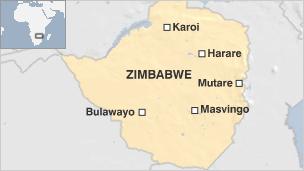
Hundreds braved the cold and the wind to stand in queues, which started forming as early as 04:30. A security guard said he saw some people sleeping opposite one polling station.
Women with babies strapped to their backs could be seen joining the queues but they were being given special preference by other voters and allowed to go to the front. Women selling tea and coffee nearby did good business as those in the queues dashed to buy hot drinks to ward off the cold.
At one polling station in Makhokhoba, voting was progressing in an impressively ordered manner. People from different parties were chatting to each other and laughing but they avoided discussing who would win amongst the three main presidential candidates, President Robert Mugabe of Zanu-PF, Morgan Tsvangirai of MDC and Welshman Ncube from the breakaway MDC party, who is expected to do well in Bulawayo.
Mr Ncube and another presidential candidate, Dumiso Dabengwa of Zapu, cast their votes in two different townships in the city.
Far away from the voting booths, Mlungisi Sibanda told me he woke up at 04:00 bathed and prayed before going to join his friends in the queue. "If we don't make history in this election, we will never do it again. This is the time to say farewell to the old man Mugabe and wish him well in his endeavours," he said.
There were, however, many people who were turned away at the polling booths for several reasons: Some found out that their names did not appear on the voters' roll despite registering while others were told their national identity documents were not acceptable.
But head of the Zimbabwe Electoral Commission Rita Makarau said because of such reports polling stations were instructed to record those not found on the voters' roll on a separate report and urged all those affected to go back to their constituencies and vote at any polling station.
For Ellias Ndlovu, who was initially turned away, this was good news and he told me he was going back to try and vote again.
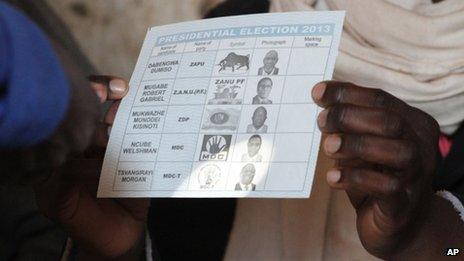
Five candidates are running for president
One old woman shouted at some polling officers after they told her not to mention the person she wanted to vote for. The woman had asked one officer to help her cast her vote since she could not write.
She then told the officer that she wanted to vote for "this young man from Silobela" - Mr Ncube.
After voting, some complained that the photos of the candidates were blurred and they had difficulties recognising them on the ballot papers.
In Bulawayo the main issues from voters are the delivery of basic services, rising unemployment - the closure of companies has left some 30,000 people out of work.
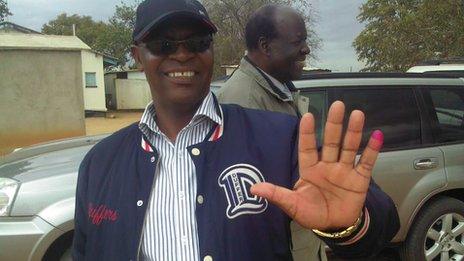
Presidential candidate Welshman Ncube shows off his finger after voting in Bulawayo, saying he was confident his party could bring devolution to Zimbabwe
"The Mugabe government has destroyed our city which was the country's industrial capital after independence but years of economic mismanagement has seen many companies relocating either to Harare or to neighbouring Botswana," Mr Sibanda said.
There are 430 polling stations around Bulawayo and voting has passed without reports of serious incidents; I spoke to one regional Sadc observer at Makhokhoba township, who said he was impressed with the manner that Zimbabweans had conducted themselves at the polls.
But some worry trouble will start after the results are announced by the electoral commission.
Police have started patrolling the streets for any trouble by excited voters and officers are visible everywhere in the city centre.
Last night some residents in Cowdray Park township held what they called a "farewell party for President Mugabe". They danced and partied all night saying this was Mugabe's last day as president.
Karoi: Nhau Mangirazi
Mashonaland West is President Robert Mugabe's home province and the rural areas are generally seen as a stronghold of his Zanu-PF party.
There have been long queues in what are called "resettlement areas" - agricultural land once owned by mainly white farmers and now redistributed.
In comparison, the queues in towns, where the MDC garners more support, were much shorter.
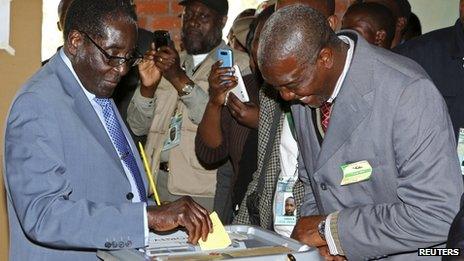
Robert Mugabe, who voted in Harare, is popular in his home province of Mashonaland West
In both urban and agricultural areas people were generally open and joking in the queues - you could not tell their political affiliation.
In towns like Karoi and Chinoyi, the provincial capital, the voters were mainly young people, compared to those in the resettlement areas who were much older.
Some uniformed officers failed to cast their votes as their names were not on the voters' roll.
One disgruntled prison officer, who refused to be named, said: ''They denied us the chance to vote in the special vote [for security and uniformed personnel about two weeks ago] when only four out of nearly 150 officers voted. Now my name is not in the voters' roll [today],'' he said.
In Chinhoyi's Ward Eight at least 112 people had been turned away towards the end of the day and 1,890 people had cast their votes.
Zanu-PF provincial chairman John Mafa said he was sure his party would win overall in Mashonaland West as its policies could empower the majority.
However, he said he was saddened by the high number of people who had been turned away in the province and in particular at the polling station in Chegutu where he voted.
''We wanted all people to vote as they are our supporters,'' he said.
Although the campaign period was mainly peaceful, Mashonaland West had isolated cases of politically motivated arson.
On Tuesday, in the resettlement area of Dick Farm, 35km west of Karoi, some polling agents were chased away after they tried to get food from a local shop.
War veteran and farmer Ben Chikanda defended the incident, saying they should know it was "a no-go area" for those not in Zanu-PF.
Meanwhile, MDC chief election agent for the constituency of Kariba said the party had notified the electoral commission and police over death threats eight polling agents had received on Tuesday at polling stations about 75km west of Karoi from a member of the neighbourhood watch.
However, Zanu-PF candidate Isaac Mackenzie denied there had been any threats and said the MDC was "just fabricating these allegations as they know they will lose".
"They are looking for scapegoats," he said.

Monica Chivera said her hut was burnt down last week in Mashonaland West
Masvingo: Godfrey Mtimba, reporter for Zimbabwe's Daily News paper
Thousands of people in Masvingo province braved the chilly weather to cast their vote - so enthusiastic were they that by 05:00 in Masvingo city's urban areas long queues were snaking for hundreds of metres as people wanted to book a place before polls opened.
Runyararo Primary School polling station recorded the longest queue which snaked for about 1km followed by a polling station in the soldiers' barracks in the central business district.
Turnout was also very high in the city's Mucheke high-density suburb whilst in the oldest suburb near the bus terminus a lot of people of foreign origin - mainly Malawians and Zambians who have lived in Zimbabwean since before independence in 1980 and were previously referred to as "aliens" - turned out in large numbers as under the new constitution they were allowed to vote for the first time.
Such first-time voters were among those most excited about casting their ballot.
But by midday many of the queues had fizzled out in the centre of town: At Chief's Hall polling station, there was no-one casting their ballot when I visited at around 15:30 and the same applied at Sisk shopping centre's two polling stations.
In Mashava, a former mining town located 40km south-west of Masvingo, the queues had also disappeared by the end of the day.
In rural areas, low turnout was recorded the whole day owing to the small number of polling stations.
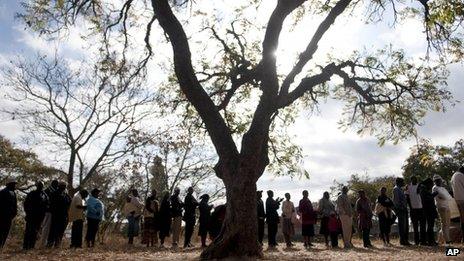
In some parts of the countryside, there were long queues - but not rural Masvingo
According to villagers, MDC polling agents and local election observers from Zimbabwe Election Support Network and the Election Resource Centre, irregularities were recorded in the rural districts of Bikita, Mwenezi and Gutu where traditional leaders and village heads lined up their subjects, forcibly marched them to the polling stations and allegedly gave them voting numbers as if to cross-check who they had voted for.
They also alleged that in these rural areas some literate people were forced to pretend they could not read or write and were assisted to cast their vote in favour of Zanu-PF.
At Utsinda Primary school in Chivi North, 285 people had cast their votes by 16:00. At Makovere School in the same arid district, 209 had voted by 16:50. No-one was turned away.
According to MDC polling agents, at Rarangwe School in Masvingo Central, about 50 voters were turned away, especially the youths, after being told they were not supposed to vote in such wards.
Sadc parliamentary observer team official Fidelis Molau expressed concern over the high number of assisted voters in Masvingo South's Nyajena area. He said 140 out of 245 voters had been assisted.
Mutare: Reporter unnamed for security reasons
Voting began in Mutare on time at 07:00. There have been long winding queues in both low- and high-density suburbs.
The atmosphere is generally peaceful and quiet although voters are complaining that the process is painfully slow.
The election is unique in the sense that all age groups are represented. Youths who have shunned recent elections are taking part.
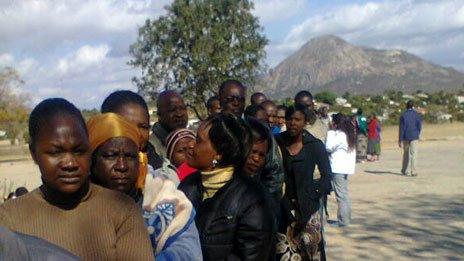
In Mutare South, held by Zanu-PF in the past, there have been long queues
Shops are closed and the police and army are patrolling and mounting road blocks. Security forces who failed to cast their ballot during the special ballot were also visible in queues.
Edward Mudede, the presiding officer at Chancellor School polling station, said everything was going to plan and was optimistic that they would be able to deliver come 19:00, when polls close.
First-time voter James Makura, 29, says he hope his vote will change things for the better.
He said he was happy to exercise his democratic right and hoped no-one would subvert the will of people.
Grace Muranda, 67, said she came as early as 05:00 to the polling station and she hoped her vote would usher in a new political dispensation.
However, there is confusion in some wards as the names of some voters were not on the electoral roll.
MDC infighting
There were winding queues to the south of the city where rural folk have shown a lot of enthusiasm during campaigning.
The Mutare South constituency has been held by Zanu-PF in the past.
There were a lot elderly people, some of whom slept outside in order to vote first.
"The long queues are frustrating. We have been here since morning, they should have put in place more polling [stations].The process is slow and I don't think they will finish," said a 24-year-old voter from Bezel Bridge in Mutare South.
Grace Madziva, 45, said if she does not get the chance by 14:00, she will be forced to go home.
But other voters said they would not give up because it was their only opportunity to shape their destiny.
Election officials who declined to be named said turnout was higher than anticipated.
"We are overwhelmed but trying our best," said one polling officer.
In Manicaland's Dangamvura-Chikanga constituency, MDC supporters find themselves in a Catch-22 situation after the party filed two candidates following a row over who should run.
The ballot papers have them both and this has divided party supporters who said they were putting their mark next to either one as they were not sure who has the party's official backing.
"We are just voting for anyone but this will split votes and lessen our chances of winning," said party activist Lloyd Bwawo, 34.
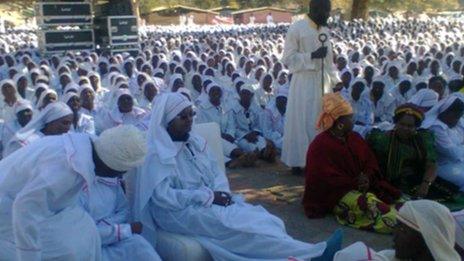
Grace Mugabe, pictured in sunglasses, at a Apostolic Church's Mafararikwa shrine last week
There was a high turnout in the rural district of Mutare West home to the infamous marange diamond mines and southern Africa's large Apostolic Church Johanne Marange sect.
During campaigning, President Mugabe and his wife Grace visited the sect's headquarters at their Mafararikwa shrine in Mutare West and donated $50,000 (£33,000) to St Noah College, a junior and senior school run by the sect, to help it expand its section for secondary students. Last year the church was given a farm in Chipinge and a donation of two tractors from the president.
There were a lot of youths, women and elderly from the sect in queues in the constituency, which the MDC is fighting to retain.